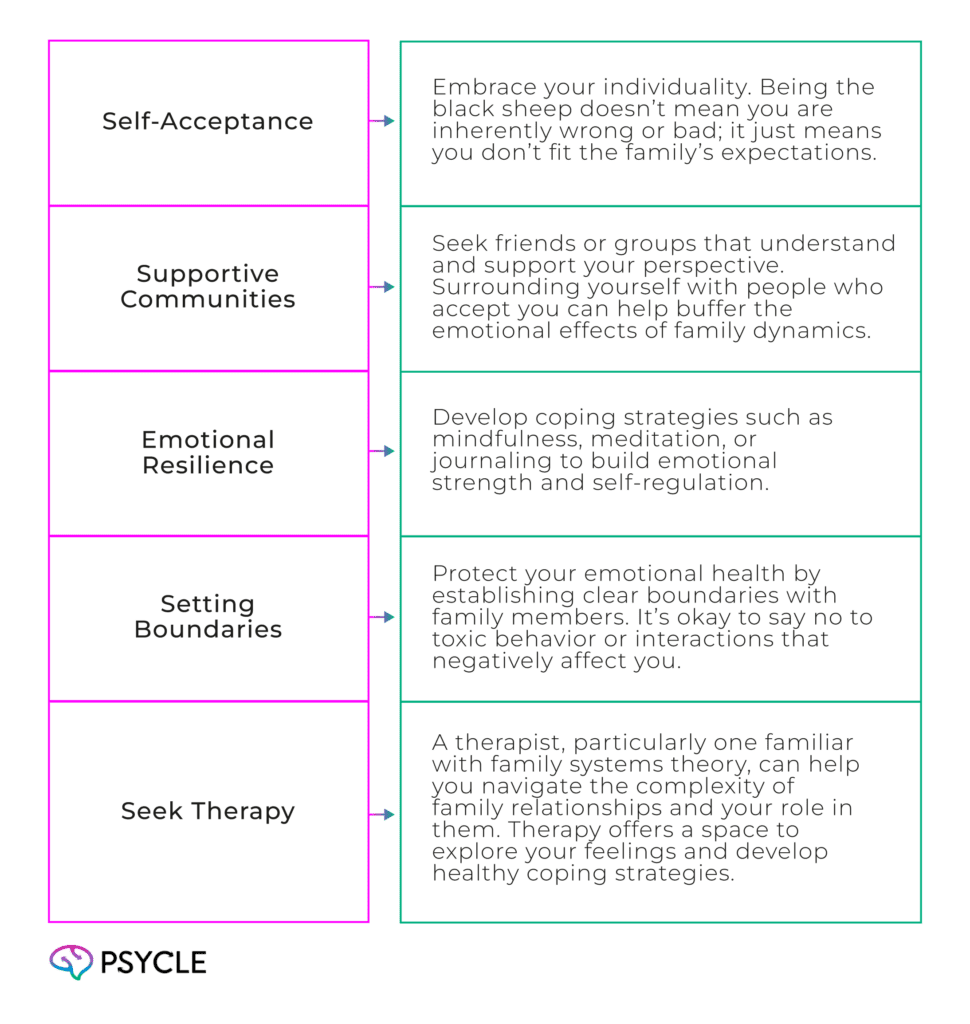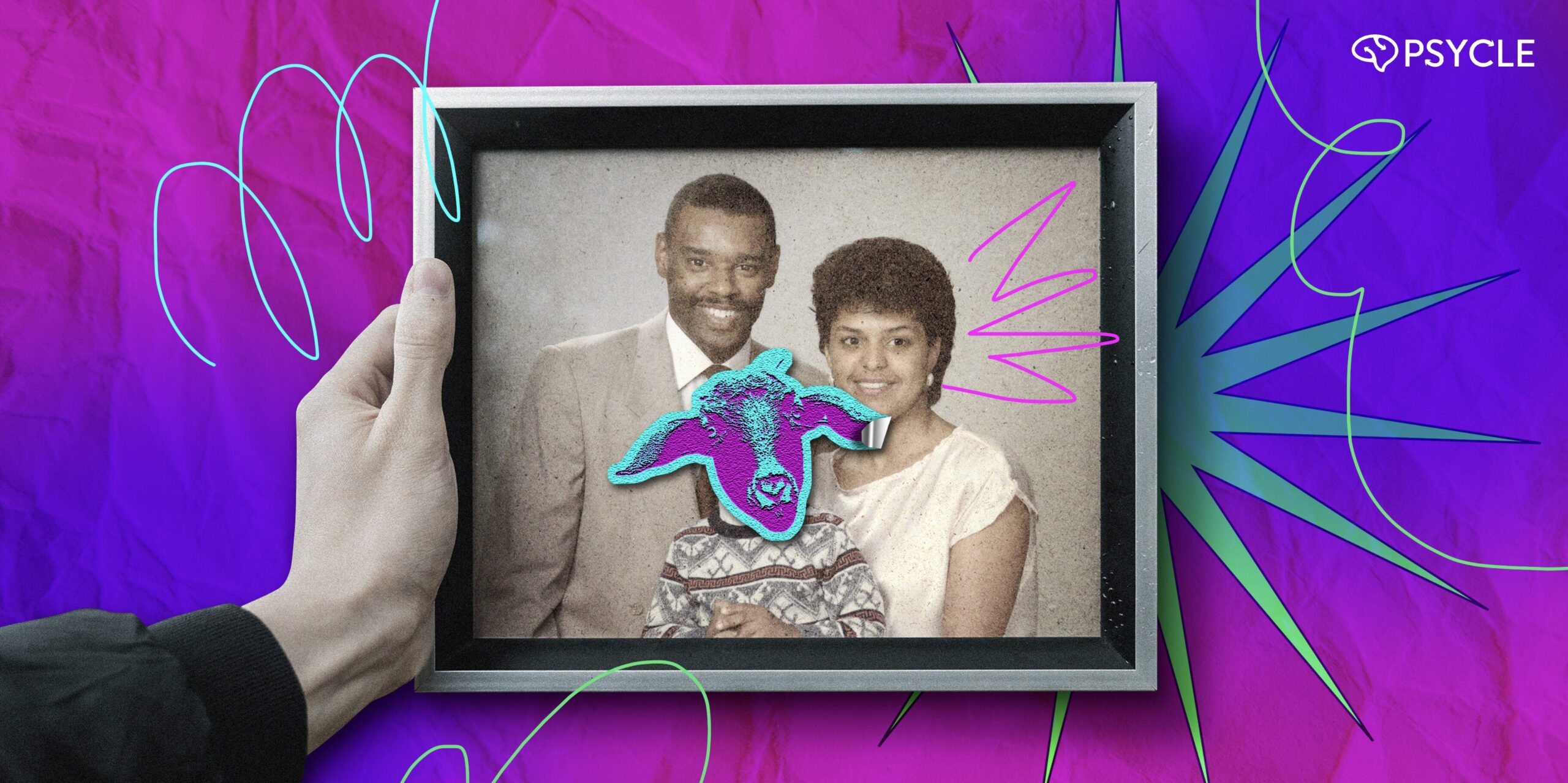Ever feel like the odd one out in your family? The “black sheep” is the family member who stands apart, often with different beliefs, values, or choices. While it can feel isolating, and highlight problematic family dynamics, being the black sheep can also be a force of strength and individuality.
This article will explore the concept and origins of the black sheep, ways to cope, and why being the black sheep can also be a superpower.
Key Takeaways
- A black sheep is often an outsider within their family, standing out due to differences in beliefs, behaviors, or values. They may face exclusion, scapegoating, or criticism.
- Common indicators include feeling isolated, being treated differently from siblings, being blamed for family problems, and facing negative talk from family members.
- In family systems, the black sheep often serves as the identified patient, reflecting deeper unresolved family issues rather than being the true cause of dysfunction.
- While being the black sheep can be challenging, it also fosters values that can empower an individual.
What Defines a Black Sheep?
The term “black sheep” originates from the idea that in a flock of white sheep, one black sheep stands out. In family systems theory, this metaphor extends to individuals who are viewed as outsiders within their family dynamics.
Black sheep are often marginalized due to their differing beliefs or behaviors that don’t align with societal expectations. As a result, they are frequently treated differently from other family members, leading them to feel isolated, misunderstood, or inadequate. In some instances, the family may even place the blame for their issues on the black sheep, using them as a scapegoat.
What Are the Signs You Are the Black Sheep?
There are several key signs that someone might be the black sheep of the family. These can include:
- Rebellion: If you consistently challenge family traditions, values, or expectations, it may indicate you’re being labeled as the black sheep. Your actions or beliefs might stand in stark contrast to those of your relatives.
- Isolation: Feeling excluded or left out during family gatherings or events is a common sign. You may notice that you’re often on the sidelines or not included in group conversations and activities.
- Being Treated Differently from Other Siblings: If your family holds you to different standards or shows favoritism toward your siblings, this can be a clear sign that you’re seen as the black sheep. They may have higher expectations for others while holding you to a different set of rules.
- Scapegoating: When things go wrong in the family, you might find yourself blamed for the problems, even if they have little or nothing to do with you. Your actions or choices may be projected onto you as the cause of family issues.
- The Family Talks Negatively About You: If your family often criticizes or discusses your flaws behind your back, it can indicate you’re viewed negatively. This behavior may be expressed openly or in private conversations, further isolating you from the family dynamic.
Being labeled the black sheep can significantly impact someone’s self-esteem and well-being. The constant sense of being different or inadequate can lead to feelings of unworthiness and self-doubt, especially during formative years when someone is forming a sense of self.
Moreover, being a black sheep can affect relationships outside the family. People may have difficulties in trust and communication as they fear rejection or judgment from others based on their experiences within their family.
How Family Dynamics Contribute to the Black Sheep
Family Systems Theory was developed by psychiatrist Murray Bowen in the mid-20th century. The theory conceptualizes the family as an interconnected emotional unit, where an individual’s behaviors and emotions are best understood within the context of family interactions. Bowen’s work marked a significant departure from the traditional psychoanalytic approaches at the time that focused solely on the individual, emphasizing instead the relational dynamics within families.
The Identified Patient and the ‘Black Sheep’ Phenomenon
In Family Systems Theory, the identified patient (IP) is the family member who shows noticeable issues or struggles, often becoming the center of concern. However, their problems usually reflect deeper, unspoken issues within the entire family. This person is sometimes labeled the black sheep—the one who is blamed, excluded, or seen as the source of the family’s troubles. In reality, their struggles may be a symptom of larger, hidden family dynamics that others prefer to ignore.
How to Cope with Being the Black Sheep
Dealing with the challenges of being the black sheep requires a combination of self-awareness, emotional resilience, and boundary-setting:

Why Being the Black Sheep Can Be Empowering
While the experience of being the black sheep can be painful, it can also provide unique opportunities for personal growth:
- Embrace Individuality: The black sheep often learns to value themselves outside family expectations, fostering a sense of autonomy and self-worth.
- Create Healthier Boundaries: By recognizing unhealthy family patterns, the black sheep can create boundaries that protect their emotional well-being. This can lead to healthier relationships in the future.
- Independence: Being the black sheep often means stepping away from family influence and finding your own path. This independence can lead to more fulfilling and positive life choices.
Final Words
Being the family’s black sheep can be painful, but it also offers an opportunity for personal growth and self-discovery. By embracing individuality, setting healthy boundaries, and finding supportive relationships, black sheep can turn their perceived outsider status into a source of strength and empowerment. If you identify as the black sheep, know that you’re not alone and that help is out there.
Sources
- https://www.sciencedirect.com/science/article/abs/pii/S017221900800104X
- https://link.springer.com/referenceworkentry/10.1007/978-3-319-49425-8_282

